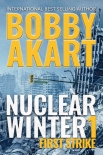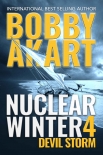Nuclear Winter First Strike Bobby Akart (children's ebooks free online .txt) 📖

- Author: Bobby Akart
Book online «Nuclear Winter First Strike Bobby Akart (children's ebooks free online .txt) 📖». Author Bobby Akart
Chandler filled the president in on what to expect. “Here are the highlights. Yemeni rebels. Funded by Iran. Their target was the Israeli delegation, but they came in a little heavy-handed and killed a lot of innocents unrelated to the peace conference.”
“A little heavy-handed, Harrison? That’s an interesting choice of words.”
“Well, sir, I think you’ll hear from the Pentagon and intelligence heads that their plan was ill conceived. If their goal was to gain revenge for the attack on the nuclear facility at Isfahan, they could’ve sent in a suicide bomber or two. Instead, they destroyed the entrance to the conference center and randomly murdered anyone in their path. It was senseless.”
President Helton sighed as he reached the open doors to the Roosevelt Room. “Aren’t they all?” he asked without expecting a response.
The windowless Roosevelt Room served as a daily meeting location for the White House staff and the president’s briefings. It had been upgraded a decade ago to include a wall of televisions and a large screen for multimedia presentations. President Helton often used this platform to conduct video conferences with foreign leaders.
As he entered, the members of the national security team and the White House communications director were getting settled into their seats. As the president entered, they all shot back up in unison out of respect.
“Good morning and thank you for coming in at this early hour,” said the president. He noticed the puzzled looks on their faces. “Well, sorry. I realize it’s been a long night for you all. Thank you for your efforts. Please sit down and tell me where we stand.”
The Joint Chiefs and the CIA director joined the director of National Intelligence in laying out the facts. Since the attack on their nuclear facility, the rhetoric out of Tehran had escalated daily. The terrorist attack had been undertaken by their proxy, the Houthi Shiite rebels in Yemen, who’d acted on behalf of the Tehran government for many years. They were just one of half a dozen well-funded groups throughout the Middle East who waged war on Western and Israeli interests.
“All right, before we address the issue of our response, especially in light of the American delegation being there, including my secretary of state, what are we doing to bolster our presence in the Persian Gulf?”
The chairman of the Joint Chiefs replied, “Sir, the Nimitz Carrier Strike Group had been operating off the coast of Somalia as we pulled troops and assets out of that country and redistributed them into Northern Africa following the Isfahan incident.
“As you know, the Nimitz was long overdue for a return to port in Bremerton, Washington, after a thirteen-month deployment. However, its skipper has assured us his people are ready to go where their Commander-in-Chief sees fit.”
“Please thank Admiral Kirk for me.” Rear Admiral David Kirk, a Hershey, Pennsylvania, native, had recently been named the new commander of the massive aircraft carrier and the flotilla of ships that surround it. “What do you have in mind for the Nimitz?”
“Mr. President, after the attack on the nuclear facility, we began the process of redeploying the Nimitz to the region. They will be entering the Straits of Hormuz within forty-eight hours. However, sir, we might need to rethink deploying the Nimitz into the Persian Gulf.”
“Why is that?”
“If the conflict between Iran and Israel escalates further into a hot war, the relatively small and nearly landlocked body of water is an anti-ship missile engagement zone. It’s rife with other potential threats that are difficult for the carrier strike group to counter, like small-boat swarm attacks, naval mines, and the Iranian’s nontraditional submarine operations.”
Days after President Helton’s inauguration, the Iranian Navy towed a refurbished mock aircraft carrier into the Strait of Hormuz, which links the Persian Gulf to the Gulf of Oman. The movement of the heavily modified barge designed in the likeness of an American flattop aircraft carrier immediately drew the attention of U.S. intelligence.
Satellite imagery revealed the mock carrier being towed into the center of the strait one day, and the next day, a large crosshair had been painted on its top deck. On day three, several fast boats operated by Iran’s Islamic Revolutionary Guard were filmed swarming the faux carrier, firing surface-to-surface missiles at the bow. The explosion, most likely generated by fuel containers stored in the front of the barge, could be seen throughout the coastal areas of the Persian Gulf and by astronauts aboard the International Space Station.
It was clearly viewed as a provocation and a message to the first-year president that Tehran was not to be trifled with. After years of being kept in check with sanctions, they were prepared to flex their muscles, apparently.
The president furrowed his brow. The Nimitz Carrier Strike Group would’ve been seen as an effective deterrent to any military action by the Iranians. “What do you suggest we do in the meantime?”
“Sir, we have an Ohio-class submarine, the USS Georgia, in the region. We can send her into the Persian Gulf, you know, high profile, to send a message. The Iranians have nothing to counteract a vessel like the Georgia, which is packed with Tomahawk cruise missiles and our special operations forces.”
“When could it arrive?”
“By tomorrow afternoon, sir.”
“Do it, General. Let them know we mean business.”
Chapter Nine
Saturday, October 19
Holiday Inn Abu Dhabi
Peter Albright stood at the window of his upper-level hotel room in the Holiday Inn Abu Dhabi. He had a bird’s-eye of the activity taking place around the National Exhibition Centre, where the terrorist attack had taken place. Large crowds had gathered around the Embassy of Iran, just across Al Maarid Street at the back of the conference location. Likewise, a contingent of U.S. military vehicles had gathered around the U.S. embassy a mere block away.
Peter had just hung up with a friend and college classmate at the University of Miami who worked as a member of the Department of




Comments (0)